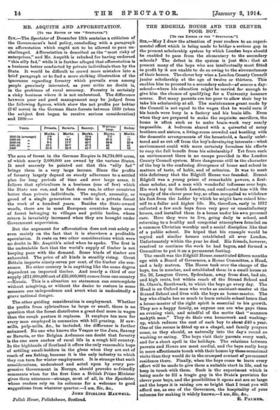MR. ASQUITH AND AFFORESTATION.
(To ran Enrron or Senora...1
SIN,—Tbe Speetator of December 13th contains a criticism of the Government's land policy, concluding with a paragraph on afforestation which ought not to be allowed to pass un- challenged. Afforestation is described as the "most risky of enterprises," and Mr. Asquith is rebuked for having endorsed "this silly fad." while it is further alleged that afforestation is a business better conducted by private individuals than by the State. It would be difficult to crowd more mistakes into a brief paragraph or to find a more striking illustration of the ignorance regarding forestry which prevails even among people genuinely interested, as your critic no doubt is, in the problems of rural economy. Forestry is certainly • risky business where it is not understood. The difference between poor and good management may be judged from the following figures. which show the net profits per hektar (2.47 acres) in the German State forests between 1830 (when the subject first began to receive serious consideration) and 1909:—
Tears. Yamada, I Bavaria. Saxony.
Wirr
Baden.
1£10-34 (average) 1860-64 .. 1880-84 „ 1295-99 „ 1909
lffroka.
71 91 1E1 111 Narks.
1T8 111 201 881
Idgis...4
2911 4E1 471 511
We;,..,1;a.
811 WS 48 85 52 Nark.
09 1E4
41
The area of forest in the German Empire is 34,734,000 acres, of which nearly 2,000,000 are owned by be various States. It need scarcely be pointed out that this "silly fad" brings them in a very large income. Since the profits of forestry largely depend on steady adherence to a settled plan for long periods of time and over large areas, it follows that sylviculture is a buainesa (one of few) which the State can run, and in fact does run, in other countries better than private individuals. The neglect, necessity, or greed of a single generation can undo in a private forest the work of a hundred years. Besides the State-owned woods, there are in most European countries large areas of forest belonging to villages and public bodies, whose return is invariably increased when they are brought under Government supervision.
But the argument for afforestation does not rest solely or even mainly on the fact that it is elsewhere a profitable speculation. It rests on two other considerations which were no doubt in Mr. Asquith's mind when he spoke. The first is the undeniable fact that the world's supply of timber is not keeping pace with the demand. Some kinds of timber are exhausted. The price of all kinds is steadily rising. Great Britain imports ninety-seven per cent, of the timber she coll- imates. No other country is in anything like the same degree dependent on imported timber. And nearly a third of our supply (£11,000,000 out of £35,000,000) comes from one country —Russia. This is a situation no statesman can contemplate without misgiving, or without the desire to restore in some measure our independence and avert what is undoubtedly a grave national danger.
The other guiding consideration is employment. Whether the profits from sylviculture be large or small, there is no question that the forest distributes a great deal more in wages than the rough pasture it replaces. It employs ten men for every man employed in connexion with bill grazing. If saw- mills, pslp.reills, &o., be included, the difference is further enhanced. No one who knows the Vosges or the Jura, Saxony or Bavaria, or the Belgian Ardetmes can doubt that forestry is the one sure anchor of rural life in a rough hill country. In the highlands of Scotland it offers the only reasonable hope of settling small-holders in the glens when they are out of reach of sea fishing, because it is the only industry to which they can turn for winter employment. It is strange that such considerations, understood and acted upon by every pro- gressive Government in Europe, should provoke unfriendly comments when for the first time a British Prime Minister gives them utterance—strange, most of all, in the Spectator, whose readers rely on its columns for a welcome to good suggestions from whatever quarter.—I am, Sir, SW,


















































 Previous page
Previous page